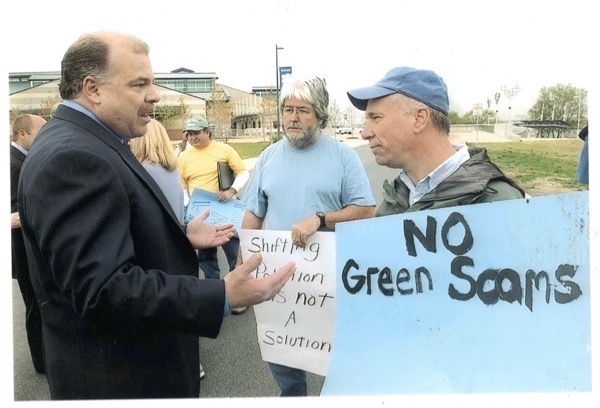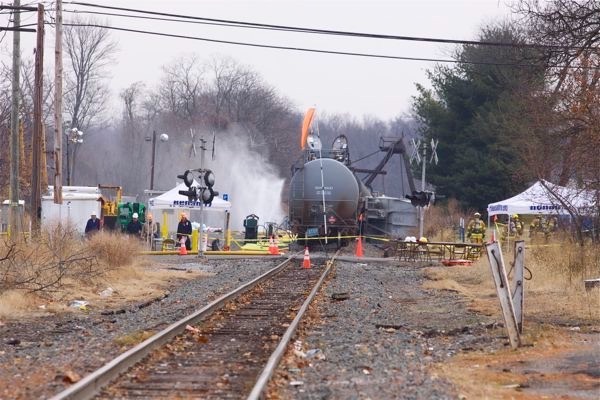Business Groups Challenge Board Of Public Utilities’ Authority To Regulate Greenhouse Gas Emissions
Business Groups Assert Radical “Major Questions” Doctrine
BPU’s Legal Vulnerability Must Be Eliminated Immediately By The Legislature
I’ve been reading NJ Spotlight articles about the business community’s attacks on BPU’s attempts to electrify the building sector.
Recent stories expand upon NJ Spotlight’s coverage of the business community’s drumbeat propaganda about the so called high cost of renewable power. They have been framed as a ridiculous right wing political attack on Gov. Murphy (e.g. “they’re coming to take our kitchen stoves”) and the Gov. appears to be in political retreat in response.
In the last 2 stories, the business community has claimed that BPU lacks legislative authority to regulate greenhouse gas emissions. They cite a “14 year old Appellate Division decision” – but don’t name it (in a related matter, I will write about the impact of the cap on solar in a future post).
NJ Spotlight buried this critical new issue in the sub-headline and final paragraph of the story, see:
“The BPU thought it could rush the approval of a major energy policy change that could ultimately cost New Jersey home and business owners hundreds of billions of dollars to implement,’’ said Sen. Anthony Bucco (R-Morris). “There also are serious concerns the BPU does not have the legal authority to set environmental policy for the state or to regulate carbon emissions, which is their clear intention.’’
Senator Bucco is making a very calculated and specific (“major policy change”) litigation threat on behalf of his corporate paymasters in that quote (he could never get a Legislative veto of BPU actions through the Democrat controlled NJ Legislature).
Although I’ve written numerous times about the lack of DEP authority to regulate greenhouse gas emissions under the Global Warming Response Act – DEP’s authority to regulate GHG emissions under NJ Air Pollution Control Act is clear – I found that claim astonishing and am embarrassed to admit that I knew nothing about such an obviously crucial legal decision.
If that legal claim is accurate, then BPU can not regulate the grid and energy infrastructure required to decarbonize the economy and transition to renewable energy.
If that claim is accurate, BPU has a major litigation vulnerability that must be eliminated immediately via passage of authorizing legislation.
After some Googling around, I just found the Appellate Division case.
It involved a 2005 McGreevey era BPU rule to require developers to pay for utility line extensions to areas not located in “smart growth” areas mapped under the State Plan. See:
Here is the core legal issue: (emphasis mine – citations omitted)
On the other hand, we have recognized that:
“[a]n administrative agency only has the powers that have been “expressly granted” by the Legislature and such “incidental powers [as] are reasonably necessary or appropriate to effectuate” those expressly granted powers. …. “Where there exists reasonable doubt as to whether such power is vested in the administrative body, the power is denied.”
An agency’s regulation “`may not under the guise of interpretation . . . give the statute any greater effect than its language allows.'” … Furthermore, we have stated that when regulations are promulgated without explicit legislative authority and implicate “important policy questions,” they are better off decided by the Legislature.
My initial thoughts:
1) NJ has its own right wing “major questions” doctrine! – Who knew?
Here is the Appellate Court’s ruling (emphasis mine):
At the heart of the present appeal is whether the authority of the BPU to incorporate smart growth principles must be found in the statutory provisions enabling it to act in the field or whether such authority is properly derived from the general provisions of the State Planning Act. We hold the authority must be stated in the Board’s enabling statute or, if expressed in a general statutory provision, the authority must identify its intent to delegate additional or incidental powers to the administrative agency granted such authority.
The Appellate Court then proceeds to engage in the kind of “historical” statutory interpretation the US Supreme Court recently relied on to kill gun control legislation and eliminate a woman’s right to an abortion.
Looking at history, the NJ Appellate Court wrote:
In 1911, the BPU was not vested with the authority to consider environmental concerns (the BPU was not vested with that power until 1970, see L. 1970, c. 273). Thus, at the time of the enactment of N.J.S.A. 48:2-27, the Legislature could not have intended N.J.S.A. 48:2-27 to apply to environmental and land use concerns.
Important to note that climate change and greenhouse gas emissions were not part of the Legislative debate or legislative intent in the 1970 in enactment of P.L. 1970, c. 273.
Although the Court cited broad BPU authority, recognized BPU’s discretion, suggested that this case was limited to service line extension, and went out of its way to note that “we are reluctant to invalidate the regulations of an administrative agency” , the legal reasoning is very dangerous.
The Court narrowly construed BPU’s environmental power:
To be sure, N.J.S.A. 48:2-23 provides that the Board may require a public utility to furnish safe, adequate and proper service, including in a manner that tends to conserve and preserve the quality of the environment and prevent the pollution of the waters, land and air of the State. More fully, the statute provides:
“The board may, after public hearing, upon notice, by order in writing, require any public utility to furnish safe, adequate and proper service, including furnishing and performance of service in a manner that tends to preserve and conserve the quality of the environment and prevent the pollution of the waters, land, and air of this State, . . . and to maintain its property and equipment in such condition as to enable it to do so.” [ N.J.S.A. 48:2-23 (emphasis added).]
That language cannot be presumed to make environmental issues or land use issues the overriding consideration in a determination to extend service to a new residential development.
Although land use and climate issues are vastly different – and BPU has had a longstanding key role in protecting clean air via regulation – I am not aware of laws that specifically and explicitly delegate authority to BPU to regulate greenhouse gas emissions.
The Court read the statutory term “environment” very narrowly and imposed an impossible and absurd historical standard:
The BPU, on the other hand, argues that N.J.S.A. 48:2-23 confers a broad environmental mandate to integrate environmental considerations into all aspects of its decision-making, and that by preventing utilities from investing in environmentally sensitive areas, the BPU is, in fact, ensuring that the utility service is environmentally sensitive. We note that while the language of N.J.S.A. 48:2-23 requires that the BPU ensure environmental compliance by regulated utilities, it does not explicitly grant BPU with the broad environmental mandate it claims. We find that the statutory language of N.J.S.A. 48:2-23 itself does not provide a clear delineation of its scope, and there is no illuminating legislative history. …
The cases examining the environmental language of N.J.S.A.48:2-23 have never construed it to provide a general mandate as broad as is urged by the BPU in this case. … In that case, BPU was authorized to require that utilities abide by environmental laws; we did not state that BPU was authorized to make environmental law.
Keep in mind that there are no DEP regulations the address electrification and greenhouse gas emissions from buildings or the grid or electrical infrastructure, thus BPU must effectively “make environmental law”.
If the legal standard is that specific and explicitly delegation and an “illuminating history” are required to authorize BPU to regulate on “major policy” issues like climate and regulation of greenhouse gas emissions, then BPU is highly vulnerable to legal challenge.
The Court also noted that the BPU regulations in question relied heavily on the State Plan and Executive Orders by Governor McGreevey.
There are direct parallels to the current BPU reliance on the Energy Master Plan and Gov. Murphy’s Executive Orders.
Keep in mind that right wing Federalist Society US Supreme Court Justices (Coney Barrett, Gorsuch) have been criticized for asserting this “radical” doctrine – and that doctrine just killed EPA climate and wetlands rules, see:
The NJ Appellate Court appears to impose exactly that “major questions” doctrine. Here is he concluding paragraph:
We understand that the Legislature has declared that smart growth is an important public policy goal, and in fact, its importance provides further reason to require legislative authorization before allowing smart growth principles to direct the course of BPU regulations where the authority for such direction is unclear. As has been observed, “a policy question of [great] significance lies in the legislative domain and should be resolved there. A court should not find such authority in an agency unless the statute under consideration confers it expressly or by unavoidable implication.” Cooper, supra, 56 N.J. at 598, 267 A.2d 533.
NJ and the NJ Supreme Court have a reputation as a liberal court and a liberal legal doctrine – these decisions suggest otherwise.
2) The Legislature Refused To Codify The Court’s Narrow Interpretation & Approach To Delegation
I recall testifying in opposition to a bill sponsored by Assemblyman Burzichelli that would have legislatively codified this “important policy questions” doctrine.
In a March 13, 2011 post, I wrote:
The legislation involved (A2486 2R) (Burzichelli, D-Oil) would codify the Christie federal consistency policy – and go even further by prohibiting proposal of rules “not specifically authorized” by the legislature, a provision the sponsor stated would require legislative approval of more stringent rules prior to agency proposal. This would put the legislature in charge of rulemaking, a radical rollback in the modern framework of Administrative and environmental law, which are founded on a broad delegation doctrine, where the Legislature delegates power to executive branch agencies to use their scientific expertise to fill in the details of complex legislation.
That bill died.
Thus, ironically, there is no legislative authorization or legislative intent that would uphold the Court’s approach to delegation and narrow statutory interpretation.
3) Where Have The Press, Environmental Groups, and the Legislature Been?
I don’t recall this decision and find it amazing that such a critical decision that stripped BPU of authority and further gutted the State Plan never got any media or environmental group attention.
As you may know (Merrill Lynch sewer line to Hopewell, et al), this controversy came at a time when infrastructure, land use, and the State Plan were hot issues. The Highlands Act had just prohibited infrastructure extensions into the Preservation Area (I wrote that language!).
The decision was issued in late 2009, and the incoming Christie administration obviously did not appeal it. The Democratic Legislature never passed a bill to put the issue on his desk and make him veto it.
It looks like this decision will now be used to kill BPU’s ability to regulate to reduce GHG emissions.
Unreal.





